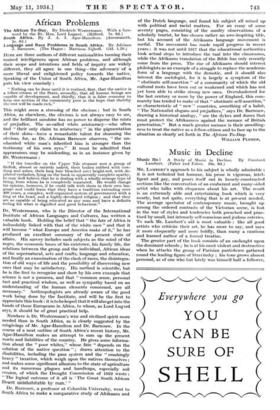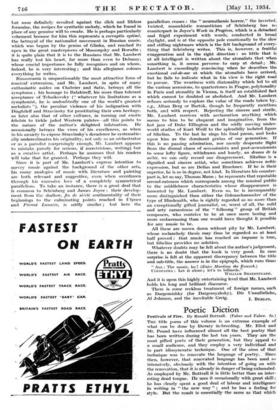Music in Decline
Music Ho ! A Study of Magic in Decline. By Constant Lambert. (Faber and Faber. 10s. 6d.)
Ma. LAMBERT'S approach to his subject is wholly admirable : it is not technical but humane, his prose is vigorous, intel- ligent and gay, and pours itself out in loosely-constructed sections like the conversation of an exuberant and many-sided artist who talks with eloquence about his art. The result is an extremely able and entertaining book which is very nearly, but not quite, everything that is at present needed. The average spectator of contemporary music, brought up among the ordered contrasts of the Victorian scene, is lost in the war of styles and tendencies both preached and prac- tised by small, but intensely self-conscious and jealous coteries. To such Mr. Lambert's aid is most valuable : like all good artists who criticize their art, he has more to say, and says it more eloquently and more boldly, than many a cautious and learned author of a formal treatise.
The greater part of the book consists of an onslaught upon the dominant schools ; he is at his most violent and destructive when he attacks the group of Parisian pasticheurs gathered round the leading figure of Stravinsky ; his tone grows almost personal, as of one who but lately was himself half a follower, but soon definitely revolted against the slick and lifeless formulae, the recipes for synthetic melody, which he found in place of any genuine will to create. lie is perhaps particularly vehement because for him this represents a ccrrruptio optimi, the betrayal of the nationalist movement in Russian music, which was begun by the genius of Glinka, and reached its apex in the great masterpieces- of Mussorgsky and Borodin ; it is quite plain that it is to the Russians that Mr. Lambert has really lost his heart, far more than even to Debussy, whose crucial importance he fully recognizes and on whom, indeed, he is very interesting ; and this allegiance colours everything he writes.
Russomania is unquestionably the most attractive form of Musical extremism, and Mr. Lambert, in spite of many enthusiastic asides on Chabrier and Satie, betrays all the symptoms ; his homage to Balakireff, his more than tolerant acceptance of Tchaikovsky (" whatever his limitations as a gymphonist, he is undoubtedly one of the world's greatest melodists "), the peculiar violence of his indignation with Diaghileff and Stravinsky for prostituting their own heritage, as later also that of other cultures, in turning out exotic kibelots to tickle jaded Western palates—all this points to the nature of the author's delighted infatuation. He occasionally betrays the vices of his excellences, as when in his anxiety to expose Stravinsky's decadence he systematic- ally underestimates his originality, not only as an orchestrator or as a parodist (surprisingly enough, Mr. Lambert appears to mistake parody for serious, if meretricious, writing) but as a creative artist. Perhaps he assumes that his readers will take that for granted. Perhaps they will. .
Since it is part of Mr. Lambert's express intention to survey music against the background of the other arts, his many analogies of music with literature and painting are both relevant and suggestive, even when overdrawn through his excessive love of a completely symmetrical parallelism. To take an instance, there is a great deal that is common to Sehiinberg and James Joyce : their develop- ment from the shallow, fin de siecle sentimentality of their beginnings to the culminating points reached in Ulysses and Pierrol Lunaire, is oddly similar ; but here the
parallelism ceases : the " neurasthenic horror," the inverted, twisted, masochistic romanticism of Schonberg has no counterpart in Joyce's Work in Progiess, which is a detached and frigid experiment with words, conducted in broad daylight, and is at the opposite pole emotionally to the slow and stifling nightmare which is the felt background of every; thing that Schonberg writes. This is, however, a fruitful exaggeration and in the right direction : so little that is at all intelligent is written about the atonalists that when something is, it seems perverse to carp at detail ; Mr. Lambert is exceedingly convincing when he describes the emotional cul-de-sac at which the atonalists have arrived, but he fails to indicate what in his view is the right road to pursue. The weariness with diatonality which led to an the various secessions, to quartertones in Prague, polytonality. in Paris and atonality in Vienna, is itself an established fact which cannot be doubted or abolished. And Mr. Lambert refuses seriously to explore the value of the roads taken by, e.g., Alban Berg or Bartok, though he frequently mentions both, and with respect. Rejecting the sincere and sterile, Mr. Lambert receives with acclamation anything which seems to him to be eloquent and imaginative, from the hot jazz of Duke Ellington and the oddly moving under- world studies of Kurt Weill to the splendidly isolated figure of Sibelius. To the last he sings his final paean, and looks upon him as the dominant genius of our generation. If this is no passing admiration, nor merely desperate flight from the dismal chaos of secessionists and post-secessionists to some lofty figure, withdrawn and lonely, an dessus de la ranee, we can only record our disagreement. Sibelius is a dignified and sincere artist, who sometimes achieves noble expression, but so are Delius and Bruckner. If he is their
superior, he is so in degree, not kind. In literature his counter- part is, let us say, Thomas Mann ; he represents that reputable second-rateness which corresponds among the musical public to the middlebrow characteristics whose disappearance is lamented by Mr. Lambert. Even so, he is incomparably more distinguished than either the Gebrauchsmusiker of the type of Hindemith, who is rightly regarded as no more than an exceptionally gifted journalist, or, worst of all, the mild and arty earnestness of the " folksong " group of British composers, who contrive to be at once more boring and more embarrassing than one would have thought it possible for any music to be.
All these are mown down without pity by Mr. Lambert, whose melancholy thesis may thus be regarded as at least half proved : that music has reached an impasse is true, but Sibelius provides no solution.
Whatever doubts may be felt about the author's judgement, there is no doubt that the book is very good. In case
surprise is felt at the apparent discrepancy between the title and sub-title, the answer is in the epigraph, which runs thus: " ALL : The music, hi)! (Enter. Mardian the Eunuch.) CLEOPATRA : Let it alone ; let's to billiards."
WILLIAM SHAKESPEARE.
And it is upon this highly entertaining level that Mr. Lambert holds his long and brilliant discourse.
There is some reckless treatment of foreign names, such as Dargomizhk-y (for Dargomyzhsky), Die Unauforliche,









































 Previous page
Previous page